 Considering that the Marx Brothers first
appeared on the screen at the time of the big switchover to sound in 1929,
this may seem a somewhat tardy moment at which to be catching up with them
and their creative capacities for combining slapstick and talk. The
explanation is simple: I am one who thinks A Night at the Opera is
the grandest, the most inventive and satiric of all their japes, the one in
which their unique combination of commentary and craftsmanship reached its
peak. But because I am putting my selections in the chronological order in
which they came, and they did not make this picture until 1935, we are just
now coming upon them. This implies no lack of regard.
Considering that the Marx Brothers first
appeared on the screen at the time of the big switchover to sound in 1929,
this may seem a somewhat tardy moment at which to be catching up with them
and their creative capacities for combining slapstick and talk. The
explanation is simple: I am one who thinks A Night at the Opera is
the grandest, the most inventive and satiric of all their japes, the one in
which their unique combination of commentary and craftsmanship reached its
peak. But because I am putting my selections in the chronological order in
which they came, and they did not make this picture until 1935, we are just
now coming upon them. This implies no lack of regard.
Indeed, it makes little difference to the permanent estimation of their work at
what point one chooses to grapple with the Marx Brothers and their style, for
they and their brand of humor are as changeless as Chaplin's Little Tramp. True,
they provided a departure of fresh and explosive surprise when they first
crashed the screen from the theater with The Cocoanuts in 1929. And their
way of bombarding the viewer with sight and word gags in a barrage that added
din to the familiar demolition of the visual did, indeed, help break the way
into sound. But they, their character conceptions and their illusory
construction of the world in which all the conventions of normal behavior are
flouted and ridiculed, are the same in A Night at the Opera
as they were in the succession of films the boys flung at an idolizing public
after The Cocoanuts.
Groucho, the spearhead of the combine, is always a confidence man―a fast talker
and a swindler who is forever trying to take somebody in. His monstrous
eyebrows, his grease-paint moustache, his perpetually mobile cigar, his shoddy
frock coat, his rasping chatter and his way of gliding in a headlong, foxy
slouch betray beyond any question the egregious conniver he is. He may be
anything―a snake-oil peddler, a quack professor, a fake psychiatrist―anything,
just as long as it is shady and gives him plenty of room to move around. In A Night at the Opera, he is
posing as an international impresario who promises to get a rich and socially
ambitious woman involved in a New York opera―naturally, for a price. Of course,
he has no connections, no knowledge of music, no prestige, nothing but unlimited
ingenuity, impudence and nerve.
His invariable sidekick is Chico, a
casual scapegrace with the innocent facade of an Italian organ-grinder―a peaked
cloth hat, a round and open face, a short, tight fitting jacket, baggy pantaloons
and an oily Sicilian accent that suggests the docile immigrant. But Chico is far
from docile. He will swindle without shame or restraint, and often, in his bland
and stolid fashion, he will beat the crafty Groucho at his game.
Chico's companion is Harpo, an
apparently lunatic mute whose broad, beaming face is sweetly haloed by a mop of
wild, curly hair (it was pink on the stage and in color pictures). He wears an
outsized raincoat and a squashed plug hat. Harpo is the pixie, the totally free
spirit of the team. He responds without guile or inhibition to all sorts of
spontaneous whims. He will pick up a powder puff and eat it with the nonchalance
and relish of a goat. He will jump aboard the banister of a circular staircase
and slide down it at a dizzying speed. He will fish into the baggy, catch-all
pockets of his raincoat and snatch forth an antique bulb-blown auto horn which
he will honk with smiling satisfaction and as a message of his ebullience to his
friends. And often, when he spies a pretty female, he will take out after her in
frantic chase, eyes glistening, coattails flying and arms stretching for a
rapacious embrace.
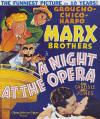
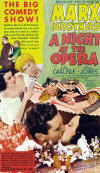
The relations of these three rascals
are usually nebulous and vague, except that they seem to work together whenever
there's a swindle to be pulled. (In their films before this, a fourth Marx
brother, Zeppo, is an obvious fifth wheel. He's just a good-looking schnook who
is usually as much a butt of their jokes as any of the other befuddled
characters who happen to get involved, and his excision from the combine was an
intelligent move.)
Obviously Groucho and Chico are
established confederates, for all their tries to horns woggle one another in the
course of their nefarious deals. And obviously Chico and Harpo are inseparable
friends, with Chico always gentle and protective toward the loveable mute,
clearly understanding his weird sign language and translating it astonishingly
whenever Harpo signals him with a shrill whistle and semaphores wildly with his
hands. This friendship between these two eccentrics is one of the subtle
felicities of the team, pointed up by the usual annoyance and impatience of
Groucho toward the mute. And it is always brought to a touching climax, at least
once in every film, when the two do a musical number, Chico playing the piano
(which he does with comic flourishes) and Harpo playing the harp. This bond of
melody between the zanies intrudes a touch of poignancy into their pranks.
It is futile and thoroughly
nonessential to seek a plot in a Marx Brothers' film. The logic of a narrative
arrangement is one of the conventions they deliberately defy. Once they have set
a point of departure and indicated whom they are out to take, the occurrence of
events thereafter is as vagrant as a tornado. Anything can happen. A random
character coming on the scene can draw their abusive attention to a totally
extraneous dead end. Then they can pop back to their swindle as though they had
never been away and, indeed, as though the pulling of the swindle were a matter
of casual concern. Or they can find themselves involved in a verbal blathering
of one another with horrible puns that eventually ends up as nothing but a
comical non sequitur.
So it is in A Night at the Opera.
It begins with Groucho making a pitch as one Otis B. Driftwood to interest a
Mrs. Claypool (Margaret Dumont) in investing in a nebulous opera which he
promises to produce. He says this will greatly elevate her in New York society.
But all this is secondary to Groucho's establishing
himself by blazing away with the shotgun banter that is his particular
forte. Indeed, he makes his entrance in a possibly Parisian restaurant
by barking imperiously at a waiter who has been paging him, "Waiter,
won't you please stop calling my name around here! How would you like to
have me go around calling your name?" It is a characteristically blatant
and egotistical crack which immediately calls the attention of Mrs.
Claypool and the audience to himself.
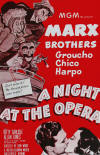
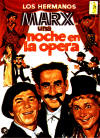
And he goes right on in this manner. Interspersed
with his pitch are random verbal asides, such as asking the waiter, "Do
you have any milk-fed chicken? Well, squeeze the milk out of one and
let me have it," or loudly complimenting Mrs. Claypool on being an
excellent businesswoman, then topping it with the glib remark, "There's
something about me that brings out the business in every woman." That's
Groucho, always pushing himself.
Harpo is brought into the picture as
the brutally banished valet of a pompous opera tenor who has caught him
gleefully ransacking the dressing room; and Chico, who is the manager of a
struggling young tenor (Allan
Jones), arrives at this moment to help Harpo get
out of the jam he's in. Thus is the standard bond of friendship between these
two scamps laid down.
Typical of their verbal hassles is a conversation between Groucho and
Chico. They have sat down in a bar to discuss the drawing of a
contract―it doesn't matter for what―but before they begin, Groucho
calls, "Two beers, bartender," and Chico, without batting an eye, calls
out, "I'll have two beers, too." Then they attack the contract, each
with a copy in his hands, swiftly running over its clauses and tearing
off those they think nonessential or they don't understand. A few
minutes of this and Groucho holds his copy away from him. "If my arms
were a little longer I could read it," he says. Then he nonchalantly
asks, "You haven't got a baboon in your pocket, have you?"
They continue with the tearing-off
business. "Now what have you got?" Chico asks.
"I've got about a foot and a half," says Groucho. "How much have you got?"
Chico is miffed. "How come your contract is longer than mine?" he wants to know.
Groucho has the logical answer: "You must have been out on a tear last night."
When they come to the last item, Groucho says, "That's what they call a sanity
clause."
Chico looks at him and chuckles wisely, "You can't fool me. There ain't no
Sanity Claus."
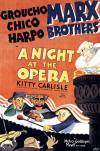
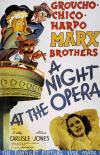
Soon everybody is embarking by ship
for New York: Mrs. Claypool; the Paris opera company, which includes an ingénue
(Kitty Carlisle), with whom Chico's aspiring tenor is in love; Groucho, breezing
along busily as custodian of Mrs. Claypool's trunks; and, for some reason, Chico
and Harpo, who are evidently taking a free ride.
Now comes a classic scene of bedlam.
Groucho and a huge steamer trunk are moved into a tiny stateroom, he beefing
indignantly but climbing in nonetheless, with Chico climbing in after him.
Groucho, with much agitation, opens a drawer of the trunk to get a shirt, finds
the innocent Harpo curled up and sleeping inside. "That can't be my shirt,"
snarls Groucho. "My shirt doesn't snore."
The steward comes to take a food
order, and some fast dialogue follows. "Have you got any stewed prunes?" asks
Groucho.
"Sure," the waiter replies.
"Well, give them some hot coffee," says Groucho. "That'll sober 'em up."
Two maids crowd in with the three
fellows, presumably to make up the berth. Then
Allan
Jones arrives; then a
manicurist, whom Groucho tells to cut his nails―short. Down the corridor waddles
a fat man, and we anticipate the gag. He shoves into the room, and Groucho
hollers from where he is squashed against the wall, "Hey, is it my imagination,
or is it getting crowded in here?"
Along comes a big charwoman,
announcing, "I came to mop up." Groucho greets her warmly, "You're just the
woman I'm looking for!" Then the waiters approach with trays of dishes, the door
flies open and all fall out, knocking trays over teacups. That's the blackout,
of course.
There is a cascade of chaos
hereafter. The boys cut off the beards of three uniformed foreign generals and
debark wearing the beards and uniforms themselves. They are greeted as visiting
dignitaries and speeded to a reception at City Hall, where they are soon exposed
as impostors and have to flee, with Groucho shouting back, "This means war!"
Eventually, they get to the opera and
turn the place into a shambles by slipping the sheet music of "Take Me Out to
the Ball Game" into the orchestra score, and then hawking peanuts and popcorn in
the aisles when the tune pops up in Il Trovatore. Chico and Harpo,
dressed as peasants, get on stage and start a riot, kidnap the villainous tenor
and put
Allan
Jones in his place. He is a sensation, Mrs. Claypool is happy, and
the boys are hauled off to jail.
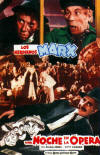
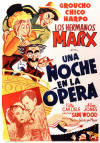
One can see the essence of the Marx
Brothers' brand of comedy: it is a complete ridiculing of reason and reality.
There is no regard for the disciplines by which so-called normal people behave
(or pretend to behave) in the chaos of their outrageous actions and words. They
mock and exploit the modes and manners of bourgeois society, making fun of
anything that smacks remotely of prudence or pomposity. Mrs. Claypool's social
ambition, the esthetics of opera, the formality of municipal receptions, all the
clichés of classy etiquette and genteel conversation that considerate people
observe are turned upside down by the Marxes in this apogee of their films. They
are, in their way, as disdainful of the sober and self-restricting rules of the
capitalist establishment as their unlikely namesake, Karl.
Here in A Night at the Opera,
we see them using the cinema medium with a sharpness of staging and tempo and a
mechanical refinement of wit that were absent or generally uneven in their early
films. It is interesting that they pretested many of the separate episodes, such
as the mix-up in the stateroom, on a West Coast vaudeville tour so that they
could find the laughs and pace the action before putting them in the film.
While they worked with several
directors (Sam Wood directed this one) and had many writers of their scripts,
the compulsion of writers and directors was to adapt material to them. The
creative pattern was as standard as Miss Dumont, always in the role of foil to
Groucho's lurid swindles and mugging displays of lechery, or Harpo's equally
preposterous sallies after girls. They also invariably included a strain of
musical comedy romance, which is carried in A Night at the Opera
by Miss Carlisle and Jones. The best to be said for the latter is that it
affords a break from the bedlam of the boys.
Needless to say, the Marx Brothers
eventually became monotonous when they and their congenital swindling began to
degenerate. The last film they made together was The Big Store in 1941.
But in the span of one decade, they managed to put a kind of neo-slapstick on
the screen that is much more presentable and potent today than that of Mack
Sennett's famous cops. It is significant that many new comics, including that
British foursome, the Beatles, have been discovering this.
